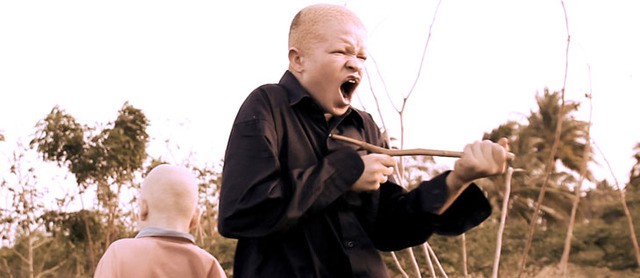 HAMISI BAZILI WITH SALUM ADBALLAH IN WHITE SHADOWA boy in flight
HAMISI BAZILI WITH SALUM ADBALLAH IN WHITE SHADOWA boy in flightThe Berlin-resident young Israeli director Noaz Deshe's remarkably promising debut feature has roughness and otherwise is a tough watch, but is packed with material, is deeply exotic yet immediate and real, and shows great flair, as well as a fascination with the tumult, color, humor, and violence of Africa.
Action revolves around a teenage boy, Alias (Hamisi Bazili), who's an albino. It begins in a rural part of an unspecified African country (actually Tanzania) where albino body parts are sought by human trackers and sold to witch doctors for a very high price. In a poetic, violent, and muddled early section, this fate befalls Alias' albino father (Tito D. Ntanga), who one night is caught and hacked to death. Fearing for her son's life and unable to protect him, Alias' mother (Riziki Ally) sends him to live with her brother Kosmos (James Gayo).
Events move from a Dickensian, marginal urban drama to a still more violent finale. After being exploited as a street peddler by the heavily debt-ridden Kosmos, who owes a gangsterish man for the truck he drives and can't pay, Alias and his small pal Salum (Salum Abdallah) wind up in a home for albinos. Salum claims he's a witch doctor himself, but others keep stealing his clients. Along the way the horror of albino persecution, which governments of three African countries and various local organizations are trying their best to combat, has been vividly brought to the life only fiction can bring.
Sometimes the sequence is unclear, and it goes on a bit too long, and may seem longer because of a wavering narrative line. But
White Shadow isn't so much about the action as about Noaz & Co.'s passion for the wildly chaotic world the film depicts with an eye for light and darkness, an absolute trust, well repaid, of the talented young debuting actors with intimate closeups, and an ability to orchestrate a whole village to engage in the fantasy of the film action, as is shown particularly in a funeral sequence and the violent finale.
Improvisation can lead to funny and colorful dialogue. Take Alias' mother's advice shouted to him as she runs along the truck carrying him to the city: "Be careful. You are being watched. Be a man. Remember what you are and where you came from. Study hard, be respectful, get a home. Eat but not too much. Share with others. Use a condom, don't get AIDS. You can't cheat life. You will be judged for your actions. Stay away from drugs. Don't be a thief. Open a bank account."
Indeed. Good advice. But Kosmos picks an unwise way to exploit a boy who needs to maintain a low profile, when he places him right off in busy traffic hawking sunglasses, DVD's, cellphones, computer parts, and other junk to passing drivers. At first Alias is shy, a washout. Then he rapidly develops a personality and plenty of moxie. From games he plays it looks like he's smarter than most around him. But it's a losing job and Kosmos seems as doomed as he is, with his debt.
Another gem: "'Jesus'? That's just another word in English. Like saying 'fuck.'" This comes from Antoinette (Glory Mbayuwayu), Kosmos' daughter, whom Alias gets very close to. You couldn't make this stuff up.
And the trade in albino parts is terribly real. Superstition reigns in the rural areas and the governments lack the clout to control it there.
Deshe, who cowrote the screenplay and music with James Masson, and edited, directed, coproduced, and was one of the cameramen along with skilled German pro Armin Dierolf, found his two main albino actors through ARCT (The Albino Revolution Cultural Troupe), which is managed by Ntanga, who plays Alias' father. Both Hamisi Bazili and his frequent sidekick in the film Salum Abdallah are remarkable young actors. There's a scene in a junkyard when Alias picks up a dead cellphone and starts a made-up conversation with Antoinette watching, convinced it's real. We too look on fascinated, hanging on every word. Rough and confusing and overlong though
White Shadow is, its filmmaker seems like a talented natural with a gift for making use of material at hand.
Noaz Deshe also composed the soundtrack of
Frontier Blues (2009), debut feature of Iranian director Babak Jalali, and has a graphic novel called
In Case We Never Meet awaiting publication, so when he says in interviews that film is just one medium for him, it's not mere youthful boasting.
White Shadow shows film is a medium he may want to continue pursuing. It got raves from Guy Lodge in
Variety, (who calls it a "staggering debut"); and Boyd van Hoeij in
Hollywood Reporter, though more critical, calls it "gripping" as well as "harrowing," and "easily accessible" and describes its young star as "terrific."
White Shadow, 117 mins., debuted at Venice Sept. 2013 where it got the Luigi De Laurentis Lion of the Future (best debut) award, then showed at Sundance Jan. 2014. Coproduced by Ryan Gosling. Screened for this review as part of the 2014 San Francisco International Film Festival (24 Apr.-8 May 2014).





